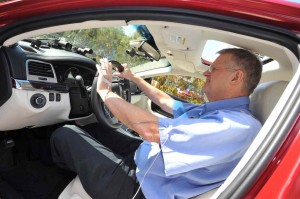A new study prepared by Ford Motor Co. and MIT indicates that new technology, such as automatic parallel parking systems, help relieve driver stress and improve overall driver safety and well-being.
The study could be seen to counter growing concerns about the huge influx of digital technology into today’s cars, trucks and crossovers, an area that Ford where Ford has set out to be an industry leader. Critics, including Ray LaHood, the U.S. Secretary of Transportation, have not only taken aim at such clear concerns as in-car texting, but even some onboard safety systems that, they contend, could also pose distractions.
The information collected during the research study suggests parallel parking is a highly avoided and stress-inducing situation for many drivers; use of advanced technology to simplify the process resulted in a more than 12 beats per minute reduction in the heart rate of test subjects.
The study itself is an extension of an ongoing alliance between Ford and MIT to improve driver focus, wellness and safety through the integration of vehicle technology.
“Ford’s collaboration with MIT and NEUTC is an important pathway to the future of transportation,” said Joe Coughlin, director of MIT’s New England University Transportation Center. “This study, which yielded significant results, showed ways we can use new technology to improve well-being and performance behind the wheel,” Coughlin said.
The study monitored drivers as they performed perceived “high-stress” tasks such as parallel parking and backing out of parking spaces with restricted visibility. The results showed a reduction in both self-reported stress levels and objective physiological measures used to monitor driver stress load.
The stress relief was most noticeable in the parallel parking study, where use of Ford’s Active Park Assist feature, offered on the Lincoln MKS, helped to significantly reduce stress on drivers compared to the manual operation of performing the same task.
Meanwhile, the study showed improvements using the Cross-Traffic Alert system, which relies on a pair of radar sensors in the rear fenders to watch out for oncoming traffic while backing out of a parking spot.
It should that with Cross-Traffic Alert, drivers were more likely to appropriately stop and yield to an approaching vehicle than when the Cross-Traffic Alert system was unavailable.
“The fact is that middle-aged Americans are at the highest point of stress and unfortunately at the lowest point of well-being in their entire life span,” said Coughlin. “The volume, velocity and the complexity of today’s lifestyle is causing individuals to report an increase in stress and a decrease in enjoyment behind the wheel,” he said.
Coughlin said consumers are seeking every edge they can in the pursuit of healthier and happier lives, yet record levels of stress are being reported. According to the Gallup-Healthways Well-Being Index, people in their late 30s to mid-50s are actually reporting the lowest state of well-being over their lifetimes.
As stress builds up incrementally throughout the day, taking proactive steps to decrease stress is important to counterbalance and maintain overall well-being, he said.
Ford has been collaborating with MIT’s New England University Transportation Center for the past seven years to understand the correlation between stress and driving performance and to identify technological advancements that both mitigate stress and create a more enjoyable experience.
“As an industry leader at the forefront of vehicle safety and security, Ford is investing in research to reduce driver stress, increase driver focus and ultimately renew the positive experience of driving and riding in an automobile,” said Andy Sarkisian, global product planning and strategy manager, Ford Motor Company. “Since 2004, Ford has been committed to implementing technological innovations that continue to further the democratization of new safety technology,” he said.
The new study likely won’t end the criticism of new onboard technology, particularly so-called “infotainment” systems, including Bluetooth hands-free calling, but it does lend credence to manufacturer claims that digital technology can enhance, rather than hinder, driver behavior in potentially dangerous situations.

